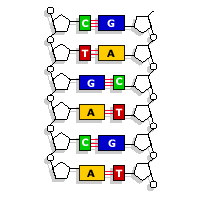When the decoding of the personal genome becomes cheap and available, private information will become public domain and may be used by various parties risking your privacy: insurance companies, employers, law enforcement authorities, friends, neighbors, commercial companies or criminals. With the completion of the human genome mapping project, the fear of importance increases
George Church, Scientific American

All babies born today in the US are tested for at least one genetic disease, phenylketonuria, before they leave the hospital. Changes in the gene known as EGFR are being tested in some lung cancer patients to see if they are likely to respond to the drug Irsa. The use of genetic tests that test the body's ability to break down additional drugs is increasing to determine the dose of the drug. These are the buds of personal medicine, which will become possible when the decoding of the personal genome becomes cheap and available.
In addition to health considerations, we are also interested in our family tree. Are we relatives of Genghis Khan or relatives of each other? We want to know what interrelationships between our different genes or between genes and the environment shaped our face, body and character. It will be possible to decipher some of these complex pathways when we have thousands or millions of personal genomes and phenomes. The phenome is the collection of features resulting from the instruction set encoded in the genome.
But the scenario according to which this new personal information will suddenly become available to everyone also raises concerns about its inappropriate use by insurance companies, employers, law enforcement authorities, friends, neighbors, commercial companies or criminals.
No one can predict what the era of personal genomics will look like before it arrives. That is why my colleagues and I recently initiated the Personal Genome Project (PGP) which is the next natural step after the Human Genome Project. We hope it will allow us to explore the benefits and risks of personal genomics with the help of volunteers, who will agree to publicly disclose information about their genome and phenome.
These databases will include complete genome sequences (46 chromosomes), digital medical information, as well as information that may in the future be part of the personal medical file, such as comprehensive information on RNA and proteins, body and face measurements, and magnetic resonance imaging (MRI) or other innovative imaging . We will also generate human cell lines representative of each volunteer and deposit them in the Curiel Cell Bank at the US Institute of General Medical Sciences. Our goal is that all this information will be available to everyone, thus allowing everyone to use it to test and create scientific hypotheses and computer programs.
A recent case provides a simple example for the future. Several PGP medical records containing my data are already publicly available online. The hematologist on the other side of the continent noticed them and even informed me with their help that I should have retested the effectiveness of the cholesterol-lowering drugs I was taking a long time ago. Thanks to him, the dosage of my medications and the nutritional recommendations were changed, thus significantly reducing the risk of at least one risk factor in my life. In the future, such events will probably not rely on luck, but on a new industry of genomic software.
The PGP was approved by an internal committee of the Harvard Medical School, and participants should be informed of possible risks before joining the project as is customary in any human research. Any volunteer recruited to the PGP will also be able to read about the experiences of previous participants before giving their consent. The open nature of the project, including full identification of the participants, is less dangerous for both the participants and the project than guaranteeing privacy, which has the risk of information leakage or hacking of the databases by hackers.
The openness of the PGP encourages scientific discovery, just like the open access policy of the Human Genome Project. Besides being a scientific resource, the project serves as an experiment in free public access and insurance coverage. In the early stages of the project, private donors will help insure a variety of volunteers against a possible event of genetic discrimination due to the PGP. A voluntary mechanism has an advantage because it does not have to be profitable in the beginning stages, yet it is likely that the insurance companies will be very interested in its results.
* George M. Church (Church) is a professor of genetics at Harvard Medical School, director of the Harvard-Leaper Center for Computational Genetics, the Genomic Technology Laboratory of the US Department of Energy, and the Centers of Excellence in Genomic Science of the US Institutes of Health. His research is comprehensive and combines methods for the analysis and production of biological molecules and cells. He owns 10 American patents and serves as a scientific consultant to more than 20 companies
